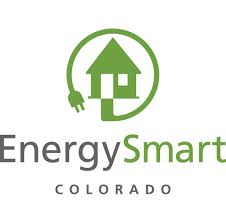With the spring equinox behind us, the sun is rising earlier and setting later. Thus, your home is being heated from the sun more and more each day. This is a great time to consider adjusting your thermostats to more seasonal temperature ranges. Lowering heating settings will save you money and save energy--just be sure to have an extra blanket or sweater handy for those chilly mornings and evenings.

Have you been using space heaters over the winter? Why not put them away! These devices consume large amounts of energy. According to Holy Cross Energy, one space heater can be costing you more than $100 extra on your heating bills. Simplified, running a 1,500 watt space heater for 24 hours (not recommended) at a rate of $0.10 per kilowatt hour will cost you $3.78 per day. Doesn’t really sound like much, does it? But, multiply that by 30 days and you have a bill with an added $113.40, just from using one space heater!
Likewise, consider saving yourself some money by turning off roof de-icing systems, such as heat tape and cables. Since temperatures are consistently above freezing, solar radiation (heat) is doing most of the work.
Tips & Tricks for Energy Efficiency
Feeling restless and bored during the COVID-19 quarantine? Have some spare time due to the lack of business? Fill your time with quick and easy energy-saving changes. Remember that your DIY projects may qualify you for a rebate. If you are interested in our current rebates or have questions about your project, please email our team at energy@walkingmountains.org before you upgrade.
Around your home, consider doing the following:
- Install programmable thermostats & LEDs.
- These are truly quick and easy ways to reduce energy usage and costs.
- Unplug unused appliances or devices, or invest in a smart power strip.
- Also remember to turn off lights in unoccupied areas of your home.
- Clean appliances & replace filters.
- This gives you time to ensure that everything is working properly while also prolonging the useful life of your appliances.
- Your refrigerator runs 24/7, why not make sure that it is running as efficiently as possible? Get the vacuum attachments out and clean those refrigerator coils
- Install water-saving shower heads & aerators.
- This saves on water and energy! The less water you use, the less your water heater needs to work.
- Insulate your hot water heater and pipes.
- This is really easy to do. Just order some pipe and water heater insulation from your local hardware store and pick it up.
- Weatherstrip or caulk leaky doors & windows.
- DIY instructions are available at the Department of Energy’s website.
- Install energy-efficient home insulation (e.g., spray foam insulation in your attic).
- A well-insulated home will maintain temperature more efficiently than a leaky home and save you money over time. This is a prime opportunity to see how duct sealing saves energy and money, as well. Sign up for a home assessment to be scheduled!
Property and business owners, and their staff, can also reduce energy use, especially in buildings that are minimally occupied or completely unoccupied.
- Set automated systems to “unoccupied” mode (or similar setting).
- If certain areas of the building are being used more than others, consider adjusting individual zones.
- Install programmable thermostats and set them appropriately for the season.
- Inspect all equipment, especially HVAC systems, to ensure everything is working properly. If able, look into having your systems serviced during this low-demand time and replace filters.
- Get rid of unnecessary energy loads by unplugging or shutting off non-essential equipment.
- For smaller equipment, such as office equipment, you can also consider investing in smart power strips.
- For larger equipment, such as unused walk-in coolers, shut off the breaker(s) in order to save on energy use.
- Hospitality properties can turn down pool and spa temperatures.
- Try to keep lighting, except hardwired emergency lighting, to a minimum. Vacancy sensors can greatly help regulate lighting use. Changing your current lighting to LEDs will also greatly reduce energy use and costs. Walking Mountains Science Center has rebates for switching incandescent bulbs to LEDs.
- Check out the Holy Cross Energy online store to find energy efficient products to start your DIY project.
Want to understand how your business is using energy and areas you can improve on? Request a business walkthrough from Energy Smart Colorado today!
The Energy Smart Colorado program at Walking Mountains Science Center is still honoring our 2019 rebates until we are back in the office and public health orders lighten. Expect our new rebates to be released soon! Visit walkingmountains.org/energy or email energy@walkingmountains.org for more information.
Online Resources for Business Owners & Contractors
- Eagle County Government - COVID-19
- Colorado COVID-19 Updates
- Holy Cross Electric - Residential & Commercial Resources
- Working on the Business: How to Self-Assess & Determine Your Plan During the COVID-19 Crisis
- International Association of Certified Home Inspectors
- The InterNACHI site has great FREE resources for Home Inspectors. You can also purchase a membership to access all of their inspector resources.
- Free course on safe procedures for inspectors - InterNACHI COIVD-19 Safety Guidelines for Home Inspectors
- Check out more resources from InterNACHI concerning your business during the crisis and what you can be doing by clicking here.
- COVID-19 Strategies Part 2: Evolving Communication Approaches & Preparing for the Other Side
- Building Performance Association Resources
- What Should I Tell My Customers About Coronavirus?: Communication Ideas for COVID-19
- ASHRAE Resources
- COVID Stimulus for small businesses
Sources:








